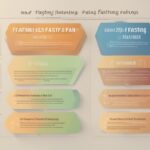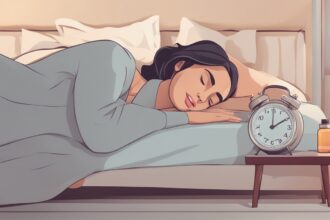Hey there, health enthusiasts! If you’ve been exploring the world of fasting, you’ve likely heard about its benefits for weight loss, mental clarity, and even gut health. But have you ever considered how fasting could impact your sleep? Today, we’re diving deep into the fascinating connection between fasting and sleep, uncovering the fasting sleep benefits that might just transform your nightly rest. Whether you’re practicing intermittent fasting, time-restricted eating, or longer fasts, understanding how this lifestyle choice affects your slumber can be a game-changer. Let’s explore the science, practical tips, and real-life applications to help you optimize both your fasting routine and your shut-eye.
The Science Behind Fasting and Sleep: How They’re Linked
At first glance, fasting and sleep might seem unrelated—one’s about what (or when) you eat, and the other’s about how you recharge. However, research shows a surprising interplay between the two. Fasting, particularly intermittent fasting (IF), influences hormones and metabolic processes that directly affect sleep quality. For instance, fasting can regulate insulin levels and reduce inflammation, both of which play a role in how well you sleep (Walker, 2017). Additionally, fasting impacts the production of melatonin, the hormone responsible for signaling your body it’s time to rest, potentially leading to deeper, more restorative sleep (Peuhkuri et al., 2012).
Moreover, when you fast, your body shifts into a state of ketosis or heightened autophagy—cellular repair processes that may indirectly promote better sleep by reducing oxidative stress. These fasting sleep benefits aren’t just anecdotal; they’re rooted in how fasting recalibrates your circadian rhythm, the internal clock that governs sleep-wake cycles. So, if you’ve been struggling with restless nights, tweaking your eating window might just be the missing piece of the puzzle.
How Fasting Can Improve Sleep Quality
One of the most compelling reasons to explore the fasting-sleep connection is the potential for improved sleep quality. Studies suggest that fasting, especially when done in alignment with your natural circadian rhythm, can enhance the duration and depth of your sleep (Moro et al., 2016). This is partly because fasting reduces late-night blood sugar spikes that can disrupt your ability to fall asleep or stay asleep. When you stop eating a few hours before bedtime, your body isn’t busy digesting food, allowing it to focus on recovery and rest instead.
Additionally, fasting may lower levels of cortisol, the stress hormone that often keeps us tossing and turning. By incorporating fasting into your routine, you might notice fewer nighttime awakenings and a greater sense of refreshment upon waking. These fasting sleep advantages are especially pronounced in time-restricted eating, where you limit your food intake to a specific window each day, ideally ending earlier in the evening.
Potential Challenges: Fasting and Sleep Disruptions
While the fasting sleep benefits are exciting, it’s important to acknowledge that fasting isn’t a magic bullet for everyone. Some people report initial sleep disruptions when starting a fasting regimen, often due to hunger pangs or changes in energy levels. Research indicates that low blood sugar during fasting can sometimes trigger adrenaline spikes, which might make it harder to relax at bedtime (Cahill, 2006). This is usually temporary as your body adjusts, but it’s something to keep in mind if you’re new to fasting.
Another challenge is the timing of your eating window. If you’re eating too close to bedtime, even within a fasting protocol, digestion can interfere with your ability to fall asleep. The key is to experiment with what works for you and to ease into fasting rather than jumping into extended fasts right away. Let’s look at some practical ways to navigate these hurdles.
Practical Tips to Maximize Fasting Sleep Benefits
Ready to harness the power of fasting for better sleep? Here are some actionable strategies to ensure you’re reaping the fasting sleep perks without the drawbacks. These tips are designed to align your fasting schedule with your body’s natural rhythms, making the transition smoother and more effective.
- Time Your Eating Window Wisely: Aim to finish your last meal at least 2–3 hours before bedtime. This gives your body time to digest and prevents discomfort that could disrupt sleep.
- Start with Intermittent Fasting: If you’re new to fasting, try a 16:8 approach (16 hours fasting, 8 hours eating) to ease your body into the routine without shocking your system.
- Stay Hydrated: Dehydration can worsen sleep quality, so drink plenty of water during your fasting window to support overall wellness.
- Avoid Caffeine Late in the Day: Fasting can sometimes heighten sensitivity to stimulants, so cut off caffeine intake by early afternoon to avoid sleep interference.
By fine-tuning these elements, you can minimize disruptions and maximize the benefits of fasting on sleep. Remember, consistency is key—stick with a schedule that feels sustainable for your lifestyle.
Who Can Benefit Most from Fasting for Sleep?
Not everyone experiences the same fasting sleep benefits, and that’s okay. Certain groups may find this practice particularly helpful. If you’re someone who struggles with insomnia, poor sleep quality, or even metabolic issues like insulin resistance, fasting could offer a dual benefit for your health and rest. Research shows that individuals with obesity or type 2 diabetes often see improvements in sleep patterns when practicing intermittent fasting, likely due to better blood sugar control (Arnason et al., 2017).
On the flip side, if you have a history of eating disorders, extreme stress, or certain medical conditions, fasting might not be the best approach without professional guidance. Always consult with a healthcare provider before making significant changes to your diet or sleep routine. For those who are a good fit, here are some specific scenarios where fasting might shine.
- Busy Professionals: If stress keeps you up at night, fasting’s potential to lower cortisol could help you unwind more easily.
- Shift Workers: Aligning fasting windows with irregular schedules may help stabilize your circadian rhythm over time.
- Fitness Enthusiasts: Fasting can support recovery by enhancing deep sleep, which is crucial for muscle repair (Dattilo et al., 2011).
Long-Term Effects of Fasting on Sleep Health
While short-term fasting sleep benefits are promising, what about the long haul? Emerging research suggests that sustained fasting practices, when done responsibly, may contribute to long-term improvements in sleep health by supporting overall metabolic balance. For example, regular intermittent fasting has been linked to reduced risk of sleep apnea in overweight individuals due to weight loss and decreased inflammation (Harvie et al., 2011). Over time, these changes can lead to more consistent sleep patterns and even a lower risk of sleep-related disorders.
That said, balance is crucial. Overdoing fasting—such as prolonged fasts without proper nutrition—can backfire, leading to fatigue or disrupted sleep. The goal is to integrate fasting as part of a holistic approach to wellness, pairing it with good sleep hygiene, stress management, and a nutrient-dense diet during eating windows. When done right, the impact of fasting on sleep can be a powerful tool for lifelong health.
As we wrap up, it’s clear that the connection between fasting and sleep is more than just a passing trend—it’s a science-backed synergy with the potential to elevate your health. From improving sleep quality to regulating hormones, the fasting sleep benefits offer a compelling reason to experiment with this lifestyle. Start small, listen to your body, and tweak your approach as needed. Remember, the journey to better rest and wellness is personal, and fasting might just be the key to unlocking deeper, more rejuvenating sleep. Have you tried fasting to improve your sleep? Drop your experiences in the comments—I’d love to hear how it’s worked for you!
References
- Arnason, T. G., Bowen, M. W., & Mansell, K. D. (2017). Effects of intermittent fasting on health markers in those with type 2 diabetes: A pilot study. World Journal of Diabetes, 8(4), 154–164.
- Cahill, G. F. (2006). Fuel metabolism in starvation. Annual Review of Nutrition, 26, 1–22.
- Dattilo, M., Antunes, H. K., Medeiros, A., Mônico-Neto, M., Souza, H. S., Tufik, S., & de Mello, M. T. (2011). Sleep and muscle recovery: Endocrinological and molecular basis for a new and promising hypothesis. Medical Hypotheses, 77(2), 220–222.
- Harvie, M. N., Pegington, M., Mattson, M. P., Frystyk, J., Dillon, B., Evans, G., … & Howell, A. (2011). The effects of intermittent or continuous energy restriction on weight loss and metabolic disease risk markers: A randomized trial in young overweight women. International Journal of Obesity, 35(5), 714–727.
- Moro, T., Tinsley, G., Bianco, A., Marcolin, G., Pacelli, Q. F., Battaglia, G., … & Paoli, A. (2016). Effects of eight weeks of time-restricted feeding (16/8) on basal metabolism, maximal strength, body composition, inflammation, and cardiovascular risk factors in resistance-trained males. Journal of Translational Medicine, 14(1), 290.
- Peuhkuri, K., Sihvola, N., & Korpela, R. (2012). Diet promotes sleep duration and quality. Nutrition Research, 32(5), 309–319.
- Walker, M. P. (2017). Why we sleep: Unlocking the power of sleep and dreams. Scribner.






